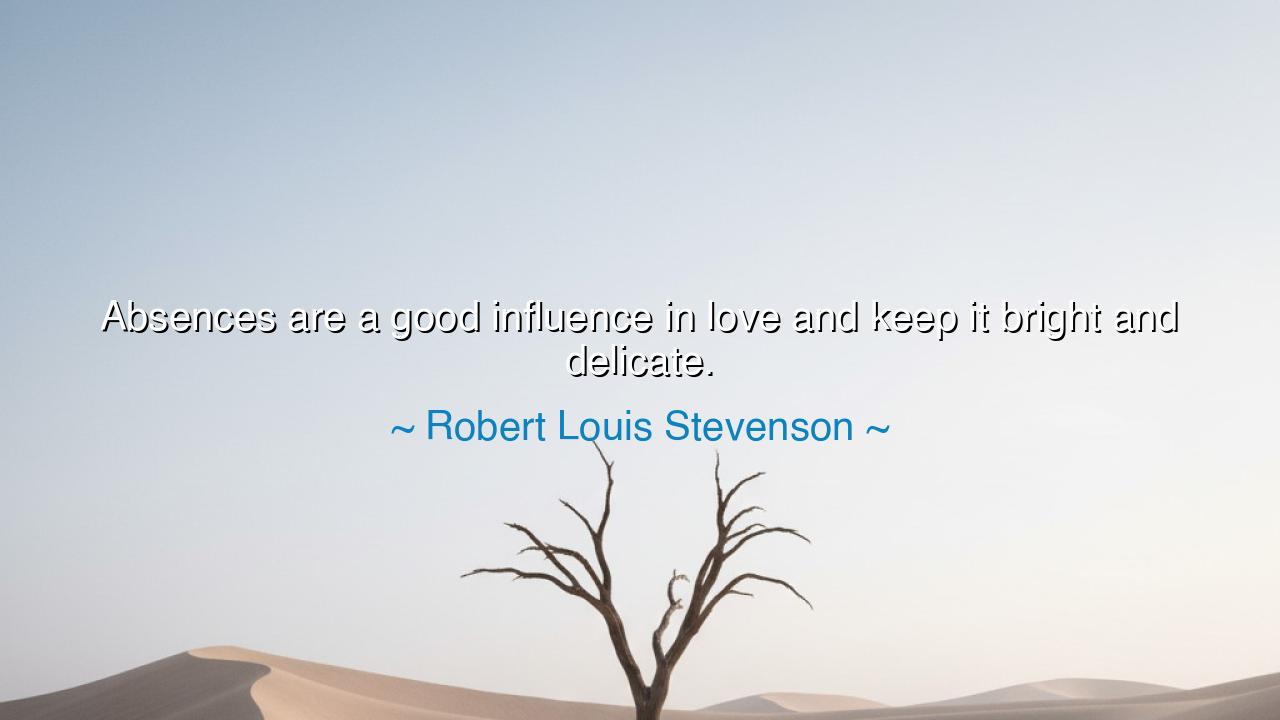
Absences are a good influence in love and keep it bright and






Hear the gentle wisdom of Robert Louis Stevenson, who declared: “Absences are a good influence in love and keep it bright and delicate.” In this saying lies a truth subtle yet profound—that love, like a flame, must sometimes be shielded from the wind of constant presence, lest it burn too hot and consume itself. For absence, though painful, becomes the very breath that gives love endurance.
Stevenson speaks of absences not as a curse but as a gift. When lovers part for a time, longing awakens, and the heart remembers what habit forgets. The smallest gestures, once overlooked, become precious; the sound of a voice, the warmth of a hand, the light of a smile—all grow brighter when distance stretches between souls. Absence teaches appreciation, making reunion sweet and delicate.
The saying draws its truth from the ancient rhythm of life. Farmers knew that fields must lie fallow to yield again, and poets sang that even the moon hides itself so the night may renew its beauty. In the same way, love is strengthened by space, for it prevents the dulling of over-familiarity and keeps affection alive with freshness.
Yet Stevenson does not glorify endless separation. He speaks of a good influence—of absences measured, like seasoning in a feast. Too much distance may wound, but the right measure preserves love’s brightness. It prevents love from hardening into habit, from growing heavy and careless, ensuring instead that it remains light, tender, and ever cherished.
Thus let this teaching be passed down: do not fear absence in love, for it is the whetstone of desire and the preserver of delicacy. Let distance remind the heart of what it holds dear, and let reunion be the harvest of longing. Stevenson’s words carry the wisdom of ages—that sometimes, to keep love radiant, we must step back, so that its light may shine the clearer.






TNThi thom Nguyen
This perspective on love is beautiful in its simplicity, but I wonder how it applies to different types of relationships. In romantic love, absence can indeed foster longing, but does it apply the same way in family or friendships? Can absence ever truly enhance a relationship without causing feelings of loneliness or disconnection? I think the real challenge is finding the balance between giving space and staying emotionally present for one another.
TMThanh Mong
I’ve always thought that a little space in a relationship can help maintain passion and excitement. This quote reinforces that idea—absence can keep love from feeling suffocating. But I wonder, can too much absence lead to isolation, or does it just allow each person to miss the other and appreciate them more? I think it’s about understanding each other’s needs and finding the right amount of space to let the love grow.
NBngoc bao
This quote speaks to the idea of appreciation growing in absence, which makes sense in theory. In relationships, we often appreciate our partner more when we don’t take their presence for granted. But how much absence is necessary to keep the relationship 'bright'? Could too much distance actually diminish the emotional connection? I think the key is in finding the right balance between togetherness and space.
PDTruong Phu Dong
I love the idea of absence in love keeping it 'bright and delicate,' but I wonder if that’s true for everyone. Some people might find that too much space leads to insecurity or doubt in the relationship. Maybe it’s more about how we handle the time apart. If the absence is used for personal growth or reflection, it might help the relationship, but if it causes anxiety, it could have the opposite effect.
VVTuy Vu Van
I find this idea interesting, but I’m not sure how I feel about absence as a 'good influence.' While space can help love stay fresh, too much absence could create emotional distance, right? I wonder how much absence is too much. Does absence truly keep love 'bright and delicate,' or does it risk leading to misunderstandings and feelings of neglect? Is balance the key to keeping love healthy?